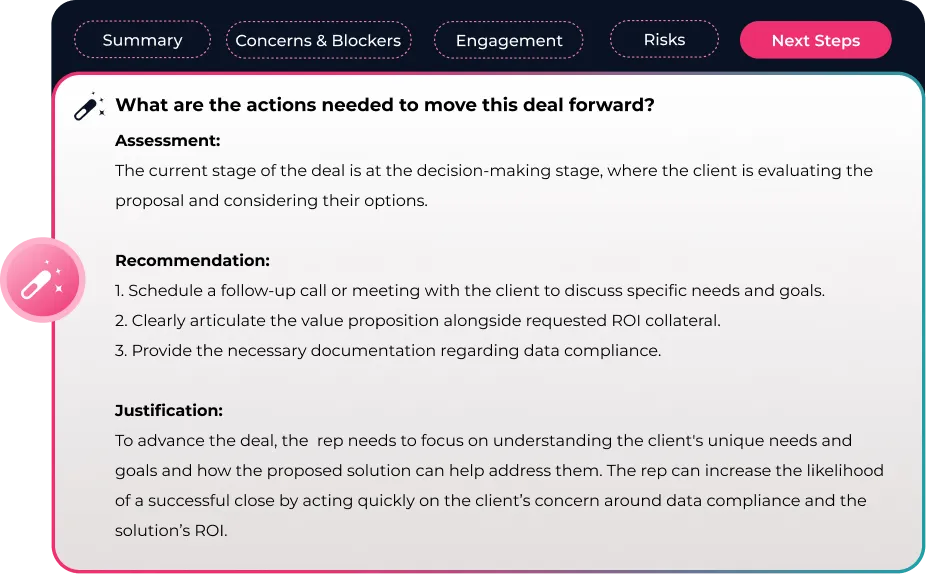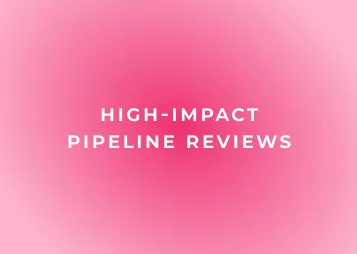60-Second Summary
Sales pipeline reviews are essential for Sales Leaders managing teams of any size. Done right, they surface high-priority deals, flag risks, improve forecast accuracy, and unlock coaching opportunities. This guide explains how to set clear review goals, use data (deal stage, value, engagement frequency), and prioritize the right opportunities. By combining conversation intelligence and revenue insights, leaders can spot stalled deals, competitor mentions, or gaps in communication before it’s too late. AI tools like Ask Jiminny deliver instant deal summaries, stage assessments, and recommended next steps, cutting review prep time and increasing coaching impact. Best practices include running reviews consistently, tailoring discussions by rep and deal type, keeping meetings concise, asking focused questions, and ending with clear action items. With structured, data-driven pipeline reviews, Sales Leaders can guide reps more effectively, accelerate deal progression, and build a culture of accountability - turning pipeline meetings into a high-value driver of predictable revenue growth.
---
Sales pipeline reviews are a critical part of ensuring that your team is on track to hit revenue targets. Whether you're managing a team of 5 or 50 salespeople, effective pipeline reviews give you the chance to course-correct, allocate resources, and guide deals to close.
But let’s face it: time is a precious commodity. Sales leaders juggle growth demands, remote teams and fast-moving deals. That's why running efficient, high-impact pipeline reviews is key to maintaining momentum.
From my decades of experience leading sales teams, I've developed a few strategies for maximizing the effectiveness of your sales pipeline reviews. Here, I’ll share how you can elevate your pipeline reviews to make more of your time.
What is a pipeline review?
There’s an old saying in sales that we’re all figuring it out as we go - yet somehow deals still close, targets get hit, and the machine keeps running. We don’t believe that’s true though. Any savvy sales leader knows the importance of bringing order to what can quickly become sales chaos, and that order is usually in the form of the humble pipeline review.
So, what is a pipeline meeting? If you’ve been in sales long enough, you already know the drill: a pipeline review is that weekly or bi-weekly check-in where you break down what’s moving, what’s stuck, and what needs attention. An efficient pipeline review meeting is the perfect opportunity to get everyone on the same page, clear roadblocks, and keep things heading in the right direction.
Want tips on building a stronger pipeline? Read our blog for tips on optimizing each of the sales pipeline stages.
Why pipeline reviews are vital
Before diving into the how of conducting a productive pipeline review, let’s touch on the why. Sales pipeline reviews aren’t just about looking at numbers. They’re a visual representation that allows you to identify opportunities, uncover risks, ensure deals are progressing and support and coach your sales team to improve their performance. Without regular reviews, you’ll be blindsided by stalled deals, missed revenue, and a stagnating team. A strong pipeline review process ensures your team stays focused on the right deals and makes informed decisions to drive them forward.
The challenge? Most revenue leaders are simply just too busy. We lack the time to dig deep into every deal, which means that a lot of pipeline review meetings can feel like a waste of time. However, when you have a clear process and the right tools, pipeline reviews can have a huge impact on your sales efforts. Here’s what they can do for you
Identify opportunities
Pipeline reviews help you zero in on the deals with the most potential, so you can focus your team’s energy where it counts.
Uncover risk
A solid pipeline meeting can reveal what’s slipping through the cracks, like stalled deals, potential losses, or pipeline gaps, before it’s too late.
Forecast more accurately
Regular reviews give you a clear view of deals in the pipeline, which ultimately helps you create trustworthy forecasts.
Keep deals moving
There’s no way around it: bottlenecks happen in sales. But a sales pipeline review is your chance to find them, fix them, and keep the momentum going.
Gain insights on team performance
A pipeline review shows you where your team is thriving and where they might need extra support or resources, giving you a better sense of how to help them grow.
Support and coach your reps
In sales, it’s not really about the deal, but about the people closing them. Both real and practice pipeline reviews give you the opportunity to offer guidance, share strategies, and help your reps overcome challenges in real-time.
Make data-driven decisions
Analyzing pipeline trends and sales forecasts allows you to steer your team with decisions based on facts, not guesses.
Manage time more effectively
A structured pipeline review process keeps you focused, so you’re spending time on what matters, rather than chasing your tail.
How to conduct a pipeline review that gets results
As a sales leader, there are things you can do to run a productive pipeline review that ensures your sales reps have the tools they need to succeed. The focus should be on creating clarity, addressing roadblocks, and driving actionable next steps to keep deals moving.
Here’s how to make it happen:
1. Setting clear goals for your pipeline review
The first step to a high-impact pipeline review is to set clear goals. What are you trying to achieve in each session? For example, you may want to:
- Identify the deals most likely to close this week, month or quarter.
- Surface deals at risk and create action plans to salvage them.
- Highlight where your team needs additional support, resources or sales coaching.
With clear goals, you avoid getting bogged down in unnecessary details and keep the review time focused.
2. Use data to drive conversations
One of the biggest mistakes I see in pipeline reviews is spending too much time on subjective opinions instead of hard data. That’s why it’s essential to bring objective data into the conversation, which can easily be achieved with a solid pipeline review template. Your Deal Insights or pipeline dashboard should give you a bird's-eye view of your entire pipeline. In a single glance, you should see:
- Deal progress and stage
- Deal value
- Frequency and type of interactions with the customer
This combination of conversation intelligence (how often and in what way you’ve engaged) with revenue intelligence (the projected deal value and stage) means you have all the insights you need in one place. No more wasting time cross-referencing different systems or asking reps for updates. With everything centralized, you can dive into structured, data-driven reviews.
And for those of you using Salesforce, having your conversation intelligence insights dashboard integrated into your Salesforce environment allows you to run your pipeline reviews from within the CRM.
.webp)
3. Focus on the right deals
Every sales pipeline has deals that require different levels of attention. During your review, it’s crucial to prioritize the ones that will make the biggest impact. From your pipeline dashboard, filter based on:
- Team or rep
- Deal type
- Deal stage
This helps ensure you’re concentrating your efforts on the most critical deals - whether those are late-stage deals that need a final push or earlier-stage opportunities that are key for future pipeline health. By filtering, you can also tailor your review to each rep, focusing on the deals that matter most to them.
4. Address risks before they derail deals
No deal is without its risks, and the faster you can identify and address them, the better. Using conversation intelligence as part of your pipeline reviews means you have instant visibility into potential hazards through proactive deal risk alerts. For instance, if a competitor has been mentioned during a call or if there’s been a significant gap in communication with the prospect, you’ll be notified and the alert will be visible in the dashboard. These alerts can be customized, so they’re highly relevant to your team’s needs.
The key advantage here is speed. Instead of waiting until it’s too late, you can act on risks as soon as they appear. You might notice that one of your top deals hasn’t had an interaction in over two weeks. Now, instead of discovering this at the end of the month, you know immediately and can intervene.
5. Leverage AI insights to accelerate pipeline reviews
The amount of data generated from sales calls and meetings is immense. Sifting through hours of conversations to figure out what’s happening in each deal can slow down your pipeline reviews. That’s why we built Ask Jiminny, our AI-driven assistant that provides insights from every touchpoint in your open deals.
With Ask Jiminny, you no longer need to rewatch calls or parse through notes. The AI generates:
- A concise Deal Summary to get you up to speed on multi-call deals in seconds.
- A Deal Stage Assessment to tell you exactly where the deal stands.
- A rundown of Prospect Concerns and Blockers so you know what’s holding up progress.
- An analysis of Risks to the deal, including competitor mentions or stalled communications.
- Recommended Next Steps, so you’re not just identifying problems - you’re solving them.
This level of insight saves revenue leaders hours, enabling you to make informed decisions on the fly, allocate resources effectively, and keep your pipeline moving.

6. Create an action plan for each critical deal
Once you’ve reviewed the data, identified risks, and pinpointed the deals that need attention, it’s time to create an action plan. A pipeline review is only valuable if it leads to concrete next steps. Every deal discussed should have:
- A clear owner (the rep or team responsible).
- Specific actions to be taken (such as following up with the prospect, addressing risks, or advancing the deal to the next stage).
- A timeline for the next touchpoint or action.
By documenting these steps, you ensure accountability and that nothing slips through the cracks. Impact requires action, so hold yourself and your team accountable here.
7. Coaching sales performance
Pipeline reviews shouldn’t just be about checking boxes - they’re an opportunity to coach your team. Use these sessions to give feedback, recognize wins, and provide guidance on stalled deals. This is where combining data and insight becomes even more powerful.
With conversation and revenue data in front of you, you can offer tailored coaching based on actual conversations and deal progression, not just gut feelings or the rep’s memory of what’s gone on. This leads to more effective coaching and a higher likelihood of moving deals forward.
Looking for tools that will help unlock your team’s potential? Check out our sales coaching software, featuring customizable frameworks and AI-powered insights.
8. Schedule regular pipeline reviews
Consistency is what keeps pipeline reviews effective, and setting a regular cadence - whether weekly, bi-weekly, or monthly - ensures you’re always in sync with your team and pipeline. Frequent reviews help you catch potential issues before they snowball, maintain accountability, and give everyone a clear sense of priorities.
Plus, a set schedule also helps your team come prepared, know what to expect, and ultimately bring meaningful updates, questions, and insights to the table. This keeps the meetings focused and productive while reinforcing the habit of staying on top of the pipeline.
Tips for more effective pipeline review meetings
Want to run meetings that feel productive? I’ve led countless pipeline review meetings, so use what I’ve learned over the years. Here are my tips for effective review meetings:
Provide a clear agenda
Provide an agenda for your pipeline review to keep it clear and focused. A typical agenda might include reviewing top deals, discussing stalled opportunities, and setting next steps. Also, be sure to share this agenda ahead of time so your reps can come prepared with questions, insights, or anything else they’d like to share.
Structure the meeting in parts
Break the meeting into sections to make sure every topic gets the attention it deserves. For example:
- Part 1: Quick updates on deal progress.
- Part 2: Address specific challenges and risks.
- Part 3: Define next steps and assign action items.
Don’t meet for too long
No one likes to waste time at work. So, keep it short and concise — 30 to 45 minutes works well. Longer meetings can lose focus and drain energy. If you need more time, consider holding individual sessions or smaller group discussions to dive deeper without overloading everyone.
Ask the right questions
The questions you ask guide the conversation, so be sure to touch on important aspects, like:
- Opportunities: “What’s the next step to move this deal forward?”
- Risks: “What’s holding this deal up, and how can we address it?”
- Team needs: “What tools or support would help you close this?”
These types of questions focus the discussion on actionable insights and next steps.
Try the Create-Advance-Close model
The create-advance-close framework can help you make sure every stage of the pipeline gets attention. This is what it involves:
- Create: What new opportunities are entering the pipeline?
- Advance: How are deals progressing through the pipeline?
- Close: What deals are ready to close, and what’s needed to finalize them?
This approach creates a well-rounded review that highlights key areas.
Keep a positive and encouraging tone
Your tone as a leader sets the stage for the meeting, so, always recognize progress, celebrate wins, and approach challenges with a collaborative mindset. Remember: encouraging your team helps maintain motivation and fosters a sales-first, problem-solving atmosphere.
Keep it solution-oriented
Challenges will always come up. When they do, focus on finding practical next steps. Use the meeting to brainstorm solutions, shift priorities, or allocate resources to help deals move forward.
End with clear action items
Always close with a clear list of next steps to provide clear direction. Examples include:
- Following up on specific deals.
- Addressing risks identified during the meeting.
- Providing tools or support requested by team members.
- Leaving with defined action items ensures everyone knows their responsibilities and can act immediately.
Put your plan into action with Jiminny
Pipeline reviews are a must for sales teams aiming to hit their targets, but they don’t have to be time-consuming or inefficient. Tools like Jiminny’s pipeline management software simplify the process, helping you turn reviews into a streamlined, high-impact part of your strategy.
With features like conversation intelligence, call recording, and real-time activity tracking, Jiminny provides the insights you need to spot opportunities, address risks, and effectively guide your entire team.
Ready to take your sales pipeline meetings to the next level? Book your free demo today and see how Jiminny can help you close more deals, faster.
Tom Lavery is the CEO and Co-Founder of Jiminny, the leading conversation intelligence and sales coaching platform that helps companies maximize their revenue. With over 15 years of experience in high-growth VC/PE-backed SaaS companies, Tom was previously SVP at Reward Gateway, now sharing his wealth of knowledge as a speaker in the conversation intelligence space.





.webp)






